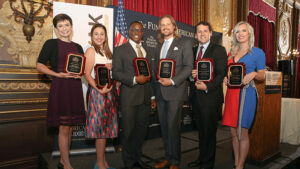
The Fund for American Studies (TFAS) is proud to have more than 200 alumni with published books who dedicate their careers to courageous journalism. Alexandra Hudson, Novak ’19, is among these accomplished alumni with her latest book “The Soul of Civility: Timeless Principles to Heal Society and Ourselves.”

As a Robert Novak Journalism Fellow at TFAS, she spent one year researching and providing in-depth reporting on her chosen topic, “Make ‘Porching’ Great Again: How Front Porch Citizenship Can Save Democracy and the Soul of a Nation.” Since then, her insightful contributions have reached CBS News, USA Today, Fox News, The Wall Street Journal, TIME Magazine, POLITICO Magazine and Newsweek.
In addition to being an accomplished author, Hudson serves as an adjunct professor at the Indiana University Lilly School of Philanthropy and is the founder of Civic Renaissance—a publication and intellectual community dedicated to beauty, goodness and truth. She is also the creator of a series for The Teaching Company called Storytelling and The Human Condition. Hudson earned her Bachelor of Arts in history from Trinity Western University and holds a Master of Science in public policy from the London School of Economics as a Rotary Global Grant Scholar.
Read Hudson’s remarks about her upcoming book, “The Soul of Civility: Timeless Principles to Heal Society and Ourselves” below and preorder your copy here.
“In my book, The Soul of Civility: Timeless Principles to Heal Society and Ourselves, coming out in October, I show why civility—basic respect for others—is essential to a free society. Here’s a story that exemplifies why.

In the early 2000s, Mayor Michael Bloomberg launched a campaign against rudeness in New York City. Subway riders and show-goers could be fined fifty dollars for inconsiderately resting their feet on a bench or for using their phones during movies or Broadway shows. The city’s noise code was overhauled to crack down on loud nightclubs and barking dogs and to promote neighborhood peace. Cell phones were banned in movie theaters, and smoking was banned in public places.
New Yorkers and local parents did not quite like being “civilized” by their local government. While proponents argued that having these laws on the books in the first place was enough to improve behavior, the laws went largely unenforced and were soon recognized as entirely ineffective.
Bloomberg isn’t the only technocrat who tried—unsuccessfully—to socially engineer civility. Similar “politeness campaigns” were tried in London and Paris in the last few decades—and related efforts have been implemented across history, too. We take for granted the many freedoms we enjoy. The ability to move, leave our jobs to pursue better opportunity, worship where and how we want, and more, however, have not always been part of the human experience. We often overlook the moral underpinnings, as well as the norms of restraint and self-sacrifice, that support the freedoms we enjoy in contemporary, democratic societies.
 By regulating the manifestations of our selfishness, civility supports our personal and political freedom. When too many of us fail to exercise civility, people will begin calling for the government to restrain us through laws and regulation. Civility promotes the virtue and self-government that allow us to thrive in community, uninhibited by either tyranny or fear of our fellow citizens.
By regulating the manifestations of our selfishness, civility supports our personal and political freedom. When too many of us fail to exercise civility, people will begin calling for the government to restrain us through laws and regulation. Civility promotes the virtue and self-government that allow us to thrive in community, uninhibited by either tyranny or fear of our fellow citizens.
By pre-ordering my book,—and also claiming the $700 worth of gifts I’ve created for you to enjoy now!—I hope you’ll join me in this movement to support and maintain the tenets of a free society, one act of decency and courtesy at a time.”

